Capitalism: A Love Story Blu-ray Movie
HomeCapitalism: A Love Story Blu-ray Movie 
Blu-ray + Digital CopyStarz / Anchor Bay | 2009 | 127 min | Rated R | Mar 09, 2010
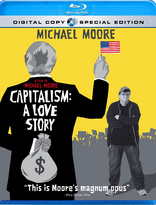
Movie rating
6.6 | / 10 |
Blu-ray rating
| Users | 4.0 | |
| Reviewer | 3.5 | |
| Overall | 3.5 |
Overview
Capitalism: A Love Story (2009)
Plenty of excitement -and controversy- is sure to surround this film from decorated documentarian Michael Moore. After previously taking on America’s gun culture (Bowling for Columbine), the Bush administration (Fahrenheit 9/11), and America’s healthcare crisis (Sicko), this timely film addresses what caused the financial crisis that stopped the world in 2008. Capitalism: A Love Story finds Moore criticizing the government bailout of privately held businesses.
Starring: Michael Moore, Jimmy Carter (I), Ronald Reagan, George W. Bush, Barack ObamaDirector: Michael Moore
| Documentary | 100% |
Specifications
Video
Video codec: MPEG-4 AVC
Video resolution: 1080p
Aspect ratio: 1.78:1
Original aspect ratio: 1.78:1
Audio
English: Dolby TrueHD 5.1
Subtitles
English SDH, Spanish
Discs
50GB Blu-ray Disc
Two-disc set (1 BD, 1 DVD)
Digital copy (on disc)
Playback
Region A (C untested)
Review
Rating summary
| Movie | 3.0 | |
| Video | 3.5 | |
| Audio | 4.5 | |
| Extras | 2.0 | |
| Overall | 3.5 |
Capitalism: A Love Story Blu-ray Movie Review
Will buyers fall in love with this latest Blu-ray offering from Starz/Anchor Bay?
Reviewed by Martin Liebman February 26, 2010I wonder how future civilizations will view our society?
Documentary Filmmaker Michael Moore once again tackles the tough issues in his latest effort,
Capitalism: A Love Story, a picture that examines -- oftentimes harshly, sometimes
humorously -- the backbone of the current American financial system. One of Hollywood's most
controversial figures, the Flint, Michigan native -- known for his casual dress, trademark baseball
cap, and unflinching and audience-splitting personal views on everything from healthcare
(Sicko) to firearms (Bowling for Columbine) -- has now settled his crosshairs
over the American capitalist system. Often loved by the left and vilified by the right, Moore isn't
gun-shy about sharing his opinions through his films, but he does structure them in pictures that
are impressively assembled and oftentimes thoroughly engaging in delivery, even if one doesn't
always agree with every, or any, point he makes. Certainly, one's own belief systems are sure to
influence any viewing of a Michael Moore film (the same can be said, however, of any film, from a
hard-hitting Political Documentary to an innocent Family Comedy), and the onus, then, is on
Moore to sell his bill of goods to an audience that's probably already made up their minds before
even seeing the film. From as an objective a point-of-view as one could reasonably expect, does
Moore succeed in delivering his message in a way that can sway his critics, reassure his
supporters, and pull the middle-of-the-road folks to his side? Yes and no. Of course it couldn't be
easy.
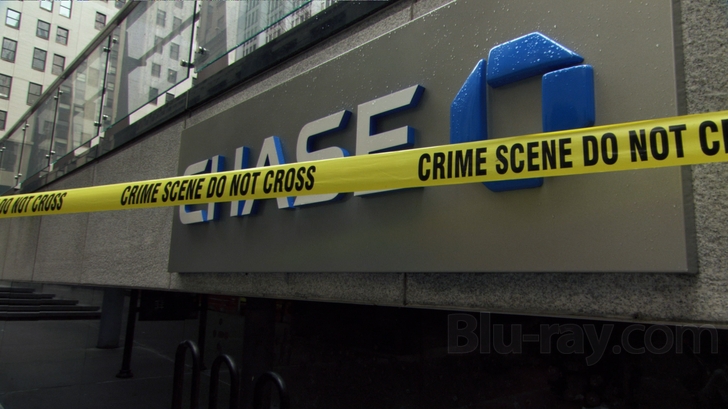
Chase what matters.
Capitalism: A Love Story delves into many of the problems Director Michael Moore sees as plaguing America's financial system and, more importantly, the threat its continuation poses to working-class Americans struggling to get by on a paycheck-to-paycheck or, in worst-case scenarios, on a day-to-day basis and in the face of foreclosed homes, lost jobs, and other unfortunate maladies. Moore begins his movie with a humorous but also pertinent comparison between the fall of the Roman Empire and what he sees as the possible imminent collapse of the United States; from there, the filmmaker examines the post-World War II economic boom and, as the country maneuvered through the decades following, the Reagan era that, according to Moore, was backed and manipulated by the country's largest financial institutions. Much of the film centers on the Reagan era and beyond, the picture often taking a back-and-forth look at the structure of the current financial system and its beneficiaries and following up with a more personal look on "the ground level" at families that have fallen victim in some way to corporate greed, whether they be those evicted from homes, families that lost a loved one and discovered that their place of business profited on the death through a hidden life insurance policy, or hard workers that aren't paid a fair wage. Moore also seeks the guidance of religious figures and their take on the capitalist system, wonders what the election of Barack Obama could mean for the future of the country, and ends the film by drawing his own conclusion of capitalism based on his experiences in making the movie.
If there's one thing that fans and critics alike can agree on, it's that Michael Moore has made himself into a master Documentarian filmmaker. His pictures are personal, yes, but Moore does a fine job in bringing his material into focus and not only shedding light on the issues of the day and the histories behind them, but also giving his material a personal touch not necessarily through his own eyes but through those that have been personally affected by whatever it is that he's examining. Additionally, Moore's films demonstrate a solid grasp of the filmmaking process; they're structurally sound, well assembled, oftentimes thought-provoking, and sure to elicit a hardcore emotional response. As divisive as they may be, Moore is a master of his craft to be sure, but if the filmmaker has a fault, it's that he can be a bit too manipulative at the expense of his themes and ideas. His personal views aside -- nobody can question his right to believe and say what he will nor can they doubt his grasp of the material, raw knowledge of it, and ability to paint a picture that's at once both personal and hard-hitting -- Moore can go a bit too far and inject into his pictures more frivolous and contrived material than is needed to drive his point home. For instance, Moore plays fast and easy with a "Nero fiddled while Rome burned" analogy, showing clips of former President George W. Bush dancing and riding a bicycle while the filmmaker discusses the onsetting economic collapse. Rather than support his point with just the facts, Moore chooses to make light of a serious situation by depicting the President at leisure or entertaining guests -- something every President has been "guilty" of -- rather than, say, a shot of him hard at work in the Oval Office. There was no footage of Ronald Reagan on horseback, Bill Clinton playing the saxophone, or Barack Obama shooting hoops anywhere else in the film, though each President engaged or continues to engage in such leisurely endeavors while serving in the nation's highest office and in times of various crises. The scene plays as a cheap shot rather than as an image that's at all relevant to Moore's point and serves as an example of the filmmaker's overzealousness to sway his audience to his side, even at the sacrifice of the larger and far more pressing issues at hand.
Moore's title, Capitalism: A Love Story, is something of a double entendre, referring to both the Wall Street financiers' love of the system while at the same time using the word "love" in jest within the context of the many downtrodden people damaged by the system that he showcases in the film. Capitalism plays out with a generally somber tone and Moore reinforces the theme with a monotone delivery in his voiceovers. However, Moore himself isn't the star of the show; the strength of the picture lies not in his examination of the corporate bigwigs and the history lessons on the ups and downs (and mostly downs) of America's capitalist system in the decades following World War II, but in the stories, eyes, and hearts of the individuals he interviews throughout the picture. Their stories are all difficult to watch; Moore allows the camera to linger on them for full effect, and it works. Regardless of his conclusions, the filmmaker's efforts in focusing on what can best be described as "the little people" make the film, and without giving it a daytime TV feel. It's through these people that Moore makes his best points, some of which derive from "below the radar" material -- for-profit juvenile correction facilities and the aforementioned life insurance scandals, for instance -- that don't make the same daily national headlines as government bailouts and executive bonuses. These stories don't serve as the picture's backbone but they do the best job of reinforcing its points. Unfortunately, Capitalism: A Love Story -- at just over two hours in length -- plays out as too long; the film gains and loses momentum with regularity, and with so much material and with such a fairly broad spectrum of ideas, it often feels like Moore is taking the "bludgeon" approach to admonishing the system rather going after it with a more delicate method. Finally, Moore smartly injects a bit of humor into the film, and Michael himself proves he knows how to find the humor even in the most difficult of situations; Capitalism: A Love Story could stand a bit more of Michael Moore the comedian rather than an overdose of Michael Moore the dour bearer of bad news.
Capitalism: A Love Story Blu-ray Movie, Video Quality 
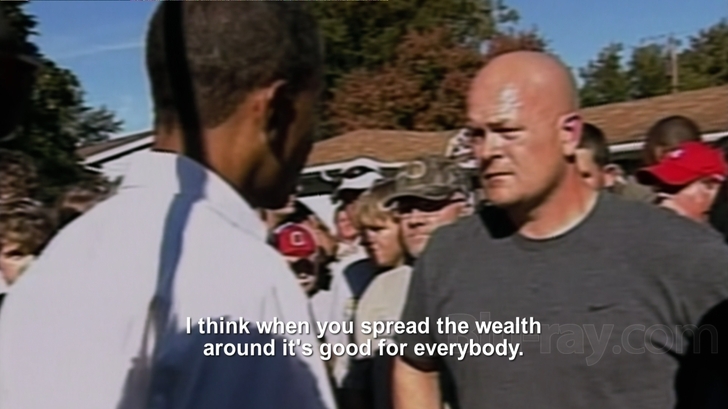
Capitalism: A Love Story arrives on Blu-ray with a stable and accurate-to-the-source 1080p, 1.78:1-framed transfer. Michael Moore's film intercuts newly-caprtured HD material with plenty of stock footage of varying qualities; as such, various scenes exhibit a myriad of technical problems -- artifacts galore, dirt and debris, poor colorization, and shoddy detail -- that are inherent to the material and do not factor into the overall score presented to the transfer. However, the newly-minted footage is solid. Capitalism isn't the sharpest or most vibrant image on the marketplace, but it does deliver a quality image that isn't hampered by any obvious or excessive technical maladies. Close-ups of human faces do exhibit a lack of fine texturing and can look somewhat undefined and poorly-realized, but otherwise, the transfer delivers solid detailing of clothing, buildings, foliage, grasses, and plenty of assorted materials and locations seen throughout the movie. There is a somewhat lifeless, flat feel to the transfer; that said, it's more an issue with the HD footage itself and the lack of a more pleasant and filmic image that's evident on well-transferred films captured on standard 35mm film stock than it is any shortcoming of this transfer. Blacks are stable throughout, flesh tones never exhibit an excessively red push, but some excess and unsightly noise creeps into a handful of scenes. Not a handsome transfer but certainly stable and nicely presented for what it is, fans shouldn't be too disappointed by what is another faithful 1080p transfer of a new release title from Starz/Anchor Bay.
Capitalism: A Love Story Blu-ray Movie, Audio Quality 
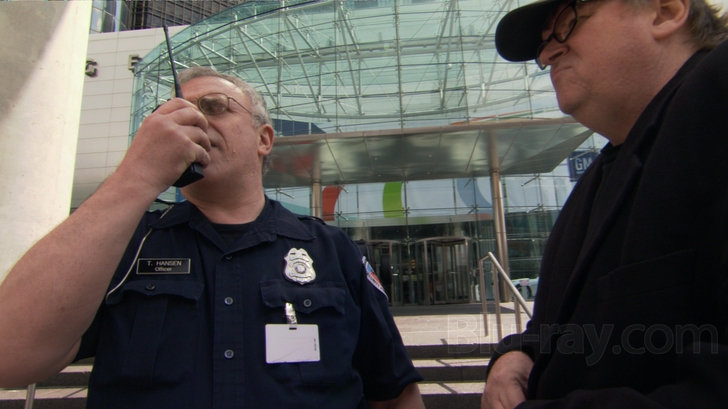
Capitalism: A Love Story arrives on Blu-ray with a whopper of a Dolby TrueHD 5.1 lossless soundtrack; documentaries rarely sound as good as this one does. The film enjoys an often loud and aggressive musical presentation that floods the soundstage with sonic goodness; pinpoint clarity and a healthy dosage of bass and surround support give the track a hefty, dominant feel even from the get-go as the picture opens and, indeed, throughout the entire two-hour production. Many atmospherics are limited to the front but there's still a fair sense of immersion into the proceedings from a sonic perspective. Michael Moore adds plenty of flair to even the archival footage with amped-up sound effects that gel surprisingly well with the classic and low-resolution imagery; bass in particular is used to excellent effect throughout the film. Whether collapsing structures or the boom of a jet flying overhead, Capitalism: A Love Story delivers a thunderous low-end that adds plenty of spice to the film. Still, much of the picture is dialogue-centric, and this lossless soundtrack delivers every syllable with ease. Capitalism: A Love Story is a surprisingly active but balanced soundtrack that, technically, easily makes for the highlight of the disc.
Capitalism: A Love Story Blu-ray Movie, Special Features and Extras 
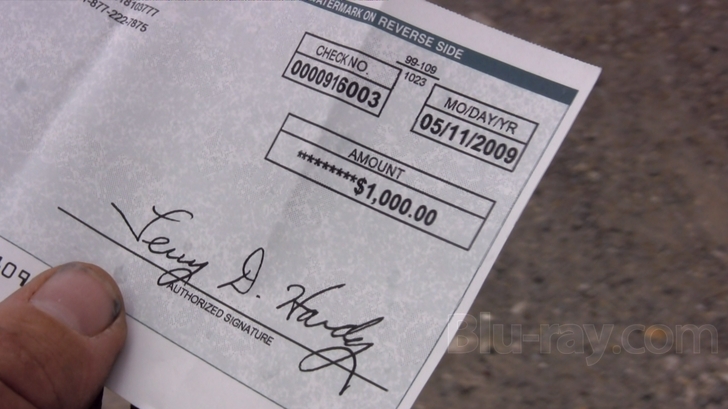
Unfortunately, this Blu-ray release of Capitalism: A Love Story comes up a bit short in the extras department. The bulk of the special features amount to what seem to be little more than deleted scenes from the film but are not explicitly billed as such. The included "bonus segments," all presented in 1080p high definition, include Harvard Professor Elizabeth Warren on How Wall Street Got Away With Murder (8:20), Sorry, House-Flippers and Banks -- You're Toast in Flint, MI (5:32), Congressman Cummings Dares to Speak the Unspeakable (7:07), 'NY Times' Pulitzer Prize Winner Chris Hedges on the Killing Machine Known as Capitalism (8:43), The Rich Don't Go to Heaven (There's a Special Place Reserved for Them!) (8:29), The Omnivore's Dilemma? It's Capitalism (6:10), Commie Taxi Drivers -- 'You Talkin' to Me?' -- In Wisconsin (5:48), How to Run the Place Where You Work (11:16), The Socialist Bank of -- North Dakota? (4:43), and The Bank Kicks Them Out, Max Kicks Them Back In (10:51). On the flip side, What If, Just What If, We Had Listened to Jimmy Carter in 1979? (17:50) is not a deleted scene but instead the full-length broadcast featuring the former President that was only briefly shown in the body of the film. Also included is the Capitalism: A Love Story teaser (1080p, 1:15) and theatrical (1080p, 2:00) trailers. Finally, disc two of this set contains a Windows-only digital copy of Capitalism: A Love Story.
Capitalism: A Love Story Blu-ray Movie, Overall Score and Recommendation 
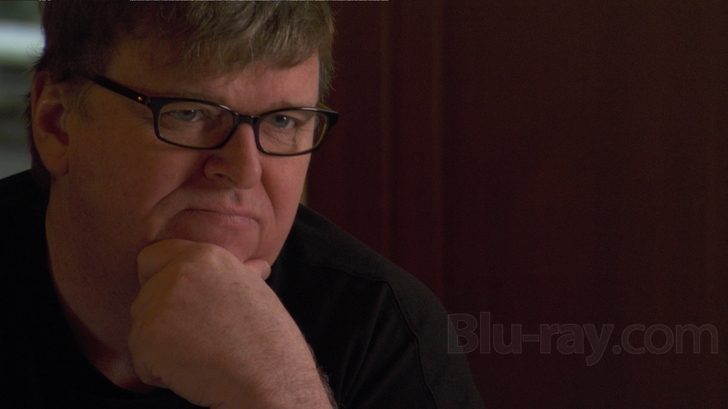
Like most of his other films, Capitalism: A Love Story is bound to divide viewers, and mostly along party lines. That's not to say that this -- or any -- of Moore's film's aren't worth watching. The filmmaker boldly crafts a film that dares to take on America's economic institution by focusing on either end of the spectrum -- the wealthy elite and the down-on-their-luck citizens -- without much in the way of even a glimpse into the middle. Moore's conclusion isn't surprising, and it's up to each viewer to decide if he came to the right one after watching the film and, hopefully, look into the issues he raises here and in the rest of his films with an open mind and, more importantly, into other areas of reference to draw a more personal conclusion. Capitalism: A Love Story represents Moore's conclusion after a lifetime of personal experience and dedicated research; it's up to each viewer to take his film not as gospel but as a springboard for further examination of the issues to reach a unique conclusion that may or may not end up reflecting Moore's. Technically, Capitalism: A Love Story is well-crafted if not a bit too long, but Moore again shows that he's got a command of the Documentary filmmaking process that should be the envy of most others in his class. This Starz/Anchor Bay Blu-ray release delivers a faithful 1080p transfer, a surprisingly rich and aggressive lossless soundtrack, and a fair collection of bonus materials, though a Michael Moore commentary track would have made a nice addition to the set. Nevertheless, Capitalism: A Love Story is worth checking out one way or another and by folks on both sides of the aisle.
Similar titles
Similar titles you might also like

Fahrenheit 11/9
2018

Roger & Me
1989

Where to Invade Next
2015

Waiting for "Superman"
2010

Sicko
2007

Bowling for Columbine
2002

Fahrenheit 9/11
2004

An Inconvenient Sequel: Truth to Power
2017

I Am Not Your Negro
2016

Prohibition
2011

Inside Job
2010

The Fog of War: Eleven Lessons from the Life of Robert S. McNamara
2003

American Experience: Into The Deep - America, Whaling & The World
2010

Whitey: United States of America V. James J. Bulger
2014

Citizenfour
2014

A Place at the Table
2012

The Gatekeepers
2012

Food, Inc.
2008

Enron: The Smartest Guys in the Room
2005

America: Imagine the World Without Her
2014
